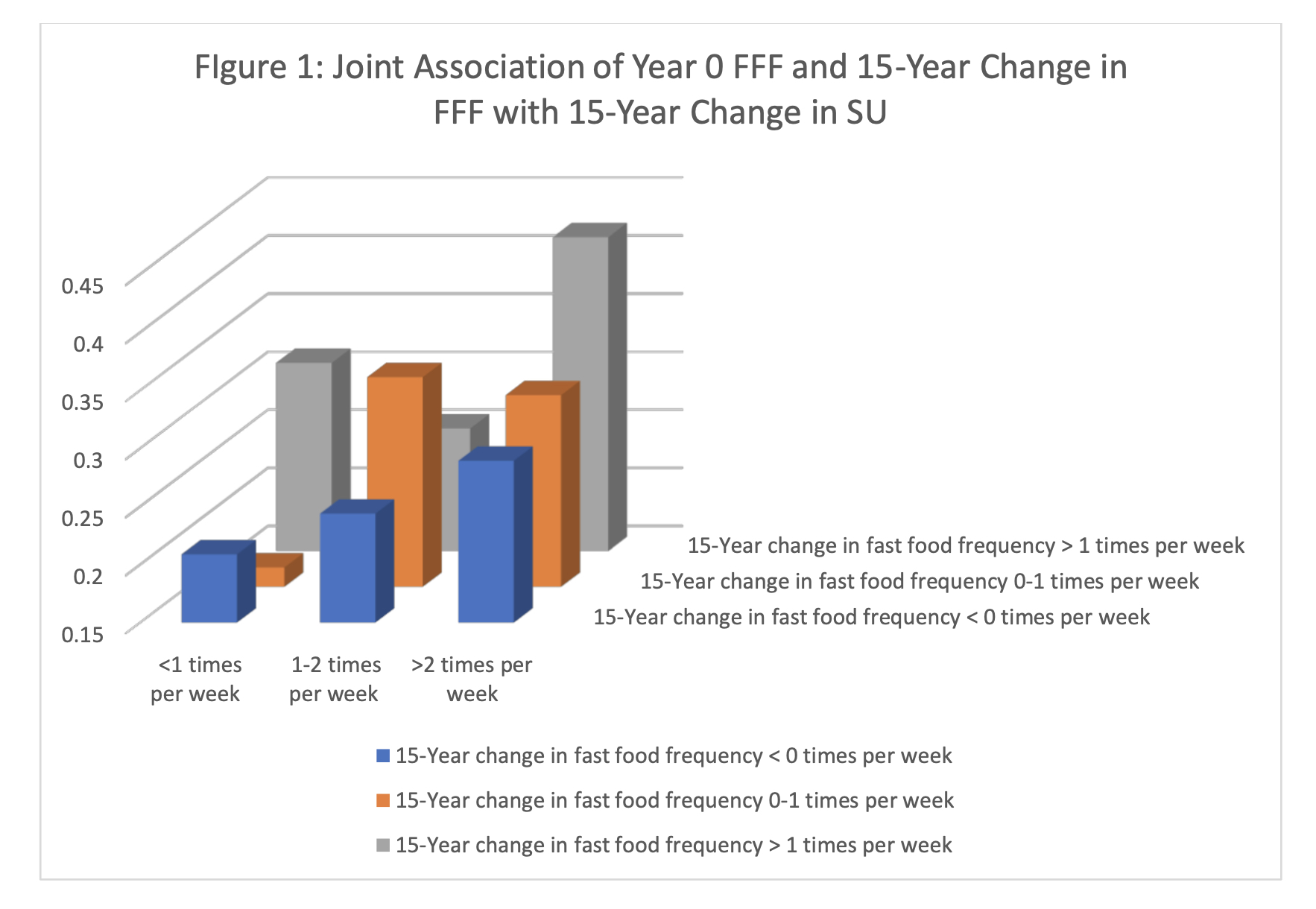Session Information
Date: Saturday, November 7, 2020
Title: Epidemiology & Public Health Poster II: OA, Osteoporosis, & Other Rheumatic Disease
Session Type: Poster Session B
Session Time: 9:00AM-11:00AM
Background/Purpose: Fast food consumption has strong positive associations with weight gain and insulin resistance. Obesity and insulin resistance are, in turn, strongly associated with elevated serum urate (SU) levels. This is largely mediated by the anti-uricosuric ability of insulin. The objective of this study was to investigate the relationship between fast food consumption and changes in SU over a 15-year period among young black and white adults in the United States.
Methods: Coronary Artery Risk Development in Young Adults (CARDIA) is a longitudinal study of cardiovascular disease risk factors and development among black and white adults in the United States who were 18-30 years of age in 1985-86 who underwent repeated dietary questionnaires and clinical and laboratory examinations. Our analysis included data from participants who had SU data available both at baseline and Year 15. Frequency of fast food consumption (fast food frequency, FFF) was quantified on a semicontinuous scale and classified as < 1, 1-2, or >2 times per week. Multivariable linear regression models were used to investigate the association of FFF at baseline as well as change in FFF with 15-year changes in SU. Difference in baseline FFF was defined as a difference in FFF consumption of 3 times a week (approximately the mean difference between individuals with low vs. high FFF) between participants. Change in FFF was defined as 3 times a week (approximately the mean range in change over time between individuals with low vs. high FFF) 15-year change within participants.
Results: Our analysis included data from 3,122 participants (Table 1). After adjustment for age, sex, education, baseline height and weight, and baseline SU, Year 15 SU increased by 0.11 mg/dL per 3 times a week difference in Year 0 FFF among both black and white participants (p=0.01 for both) (Table 2). SU increased by 0.09 mg/dL per 3 times a week increase in FFF from Year 0 to Year 15 among white participants (p=0.01) but not black participants (beta =0.003, p=0.93) (Table 2). There was a significant correlation between weight change and SU change (correlation coefficient 0.34, p< 0.001). Figure 1 depicts the joint associations of Year 0 FFF and 15-year changes in FFF with change in weight. Compared to the average 15-year SU change among participants with baseline FFF < 1 time per week and 15-year FFF change < 0 time per week, those with high FFF at both baseline and follow-up had an extra 0.21 mg/dL increase (i.e., 75% of overall population SU increase over 15 years [0.28 mg/dL]) in SU during that time. After adjusting for covariates in model 2, change in weight (beta=0.03, p< 0.001) and homeostasis model for insulin resistance (HOMA) (beta=0.05, p< 0.001) remained significantly associated with SU change.
Conclusion: Fast food consumption has strong positive associations with SU, suggesting that fast food increases the risk of hyperuricemia and gout. The observed association is likely mediated by weight gain and resultant changes in insulin resistance.
To cite this abstract in AMA style:
Yokose C, Lu N, McCormick N, Choi J, Zhang Y, Choi H. Fast Food Habits and Serum Urate Change in Young Adults: 15-Year Prospective Cohort Analysis [abstract]. Arthritis Rheumatol. 2020; 72 (suppl 10). https://acrabstracts.org/abstract/fast-food-habits-and-serum-urate-change-in-young-adults-15-year-prospective-cohort-analysis/. Accessed .« Back to ACR Convergence 2020
ACR Meeting Abstracts - https://acrabstracts.org/abstract/fast-food-habits-and-serum-urate-change-in-young-adults-15-year-prospective-cohort-analysis/



